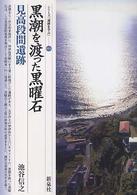- ホーム
- > 洋書
- > ドイツ書
- > Social Sciences, Jurisprudence & Economy
- > Politics, Society, Work
- > political science
Full Description
Modern politics is highly science-dependent and knowledge-driven. What is the rightful role of expert knowledge in political life? How can the truth claims of science be reconciled with principles of democratic control and lay participatory rights in decision-making? This collection of essays by political scientists, sociologists and economists from Germany, France and Norway provides different empirical and theoretical analyses of the complex organising and legitimising power of knowledge in political governance. The authors shed light on key dimensions and dilemmas that have shaped the world-changing interrelations between politics, social institutions and scientific knowledge in the past century. The contributions cover issue-areas and policy-fields such as population control, health economics, ICTs and higher education reform, and the politics of productivity and economic pre-eminence.
Contents
ContentsCertainty - Peter Wagner: Epistemic Certainty Questioned. On Science Wars and Scientific Revolutions - Ole Jacob Sending: From Order to Governmental Rationalities? Population Policies and the Formation of Global Knowledge Regimes - Linda Sangolt: A Century of Quantification and "Cold Calculation." Trends in the Pursuit of Efficiency, Growth and Pre-eminence - Alain Desrosieres: A Politics of Knowledge-tools. The Case of Statistics - Bettina Wistrom: Is it Healthy to Measure? A Systematic Analogy between Harsanyi's Social Choice Theory and the Standard Gamble. Quality Adjusted Life Years (QALY) - Gunnar Guddal Michelsen: Information and Communication Technologies (ICTs) and the Transformation of the University.








